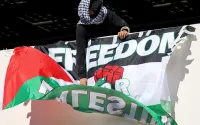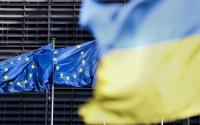Gaby Hinsliff, Martin Bright, Peter Beaumont and Ed VulliamySunday February 9, 2003
Late last Tuesday night, a three-page email started circulating among a select group of friends concerned about the impact of sanctions on Iraq.
Full of academic outrage, it explained how the so-called 'secret spy dossier' published last week by the Government as a crucial plank in the argument for why the West should go to war was largely cribbed from an American postgraduate's doctoral thesis - grammatical mistakes and all - based on evidence 12 years out of date.
And, to cap it all, the finished document appeared to have been cobbled together not by Middle East experts, but by the secretary of Alastair Campbell, the Government's chief spin doctor, and some gofers.
It is no surprise, then, that when the email from Glen Rangwala - a 28-year-old Cambridge politics lecturer who stumbled across the plagiarism when he was sent a copy of the dossier by researchers in Sweden - reached two teenage Cambridge students they decided it deserved a wider audience.
One, 19-year-old Daniel O'Huiginn, forwarded the email to journalists.
In the propaganda wars that are now as crucial as any military build-up in the Gulf, Tony Blair last week fell victim to friendly fire.
There has been significant collateral damage - and at the worst possible time. A crucial vote in the UN Security Council is pending. Colin Powell, the US Secretary of State, praised the document as a 'fine paper' and has been embarrassed by association.The anti-war campaign has been handed a large stick with which to beat the Government.
As Downing Street mounts an investigation into how it went wrong, questions are being asked by a public that is still sceptical of the case for war on Iraq. Does this mean that the Government is starved of decent intelligence? If our security services are coming up with good material, why are we not being shown it? If our information is untrustworthy, what about that gathered by the Americans? Who - what - can we believe?
The debacle stems from Downing Street's desire to combat charges that the reason why UN inspectors hunting weapons of mass destruction in Iraq had found no 'smoking gun' was because there was nothing to find.
Discussions between the Prime Minister's head of strategic communications, Alastair Campbell, his foreign policy adviser, Sir David Manning, senior officials in MI5 and MI6 and the new head of homeland security, Sir David Omand, resulted in a decision to repeat a wheeze from last autumn: publishing a dossier of 'intelligence-based evidence'.
This time it would focus on Saddam's history of deception. But with Hans Blix, the head of the inspection programme, due to make a crucial report to the UN in mid-February, time was short.
The publication of the previous dossier, focusing on Saddam's human rights record and making the case that the dictator was a threat to the West, had led to several stand-up rows between Omand and Campbell, with the former accusing the latter of sprinkling too much 'magic dust' over the facts to spice it up for public consumption. In the end, the more sensationalist elements were confined to a foreword written by Foreign Secretary Jack Straw, while the facts were left to speak for themselves.
But when it came to the most recent document, there was no time for such niceties. Led by Campbell, a team from the Coalition Information Centre - the group set up by Campbell and his American counterpart during the war on the Taliban - began collecting published information that touched on useful themes.
The key element was an article by Ibrahim al-Marashi, a postgraduate student from Monterrey in California, which seemed to illustrate some of the key arguments about deception, even though it was based on evidence dating back to 1991. Two further chunks from articles in Jane's Intelligence Review - one written by Sean Boyne, an analyst opposed to war on Iraq - were downloaded straight from a website.
Working against the clock with fairly thin material, insiders admit that corners were cut. Marahashi's words were changed to exaggerate their meaning: 'monitoring' foreign embassies became 'spying', while 'opposition groups' was transformed into 'terrorist organisations'. The cut-and-paste job was so incompetent that, in combining al-Marashi's work with Boyne's, it confuses two different organisations.
Had it really been written by the four authors credited on the email - Paul Hamill, a Foreign Office official; John Pratt, a junior gofer from Number 10's Strategic Communications Unit; Alison Blackshaw, Campbell's PA; and Mustaza Khan, another official working under Campbell - that might not be surprising.
But Campbell himself is said to have edited and cleared the finished version. Downing Street insists that, for all the red faces, nobody - including al-Marashi - has challenged the accuracy of what is in the dossier. Academics disagree. 'The information presented as being an accurate statement of the current state of Iraq's security organisations may not be anything of the sort,' Rangwala's email concluded.
And that more damaging accusation reflects a murkier power struggle over the Government's use - some say abuse - of intelligence material in the desperate battle to win support for war.
When on Wednesday morning the BBC's Today programme started broadcasting the contents of a classified defence intelligence briefing warning bluntly that there was no link between Iraq and al-Qaeda - there had been contacts in the past but, as a secular state, Iraq was anathema to the fundamentalist terror group -- ears pricked up all over Whitehall.
An unprecedented leak, it was immediately interpreted as a warning: if Blair continued to imply, in the teeth of the evidence, that there was some kind of connection between Iraq and al-Qaeda he would not be able to get away with it.
It is not that the intelligence services are necessary anti-war. Intelligence sources told The Observer this weekend that the case for war was a good one, but complex. 'People want to be shown something cut and dried,' one source said. 'They want evidence of a big shiny warhead. The real case is... that, after 11 September, the world changed in such a way that we can no longer accept risks to our security.
'Here we are dealing with a rogue regime that is potentially one of the biggest proliferators of weapons of mass destruction. So the question is: do we let that go on and face a real and terrible risk some time down the road, or do we insist that Iraq abides by its commitments to disarm? It is a serious issue... but it is not a great story to sell the British public.'
But this is at the very heart of Blair's problem. Faced with a issue that even his intelligence advisers have long known is impossible to dramatise, Number 10 has instead tried to argue its way around opposition to intervention. And journalists, peace activists and the British voters have not been blind to these evasions.
Downing Street's efforts to sell the case for war have created a tension with MI6 that has mirrored that between the White House and Pentagon civilian staff and the CIA, DIA and FBI across the Atlantic. There the White House has established a shadow, parallel intelligence network staffed, not by espionage professionals but by favoured political appointees who are providing answers far closer to what the administration want to hear.
For months British intelligence officers - like their counterparts in the US - have been insisting that there is no hard evidence of a link between Saddam and al-Qaeda, while at every turn their political masters have been insisting the opposite. They have been briefing that Saddam's weapons programme has been so disrupted it is almost utterly redundant: meanwhile, the politicians have insisted that it is still a threat.
But what all do agree on is that Saddam is hiding chemical and biological weapons or the ability to make them.
One further issue has proved contentious. While US spy agencies have produced their best material for Powell, in Britain there has been resistance from MI6, which has been unwilling to allow material from human intelligence sources to be used in the propaganda effort.
British intelligence officials admit that the cumulative effect of all these issues has been to give the impression of an 'incoherent' argument about Iraq that has appeared to be deeply inconsistent in both detail and focus.
This has affected the international stage, too. There are scornful mutterings in French political circles this weekend that they cannot be expected to back a war on Iraq until Britain produces something more compelling than a 'failed doctoral thesis'. Diplomatic sources say French Ministers are now openly 'vitriolic' in their opinions of George Bush.
The irony is that it might otherwise have been a successful week in the battle for hearts and minds. Four million Britons switched on to BBC1 on Thursday night to watch Jeremy Paxman grill a shirt-sleeved, earnest Blair over the war, a performance with which his aides were happy. In front of an almost uniformly hostile audience in Newcastle, the only moment of tension came when Paxman asked Blair if, as a religious man, he prayed with Bush. The Prime Minister let his irritation show: he knows the single most damaging charge in the Arab world is that a war would be a Christian crusade against Islam.
Even Tony Benn's interview with Saddam, broadcast on Channel Four on Tuesday night, ended almost satisfactorily for Downing Street. Aides watched first with disbelief, then with mounting anger, as Benn put a series of unchallenging questions to the Iraqi dictator. By the end of the interview, the mood had turned to one of wry amusement. The consensus was that Benn, one of the most dangerously popular stars of the anti-war movement, had fumbled the ball badly.
Yet all of that has been undermined by a government spin too far.
One crumb of comfort is that with Blair's reputation for trustworthiness on the war already dented - a poll last week found that, while 81 per cent of Britons believe UN inspector Hans Blix, only 43 per cent trust Blair to tell the truth over the war and only 22 per cent trust Bush - the dossier debacle is unlikely to make it any worse.
'This is a lot like the way sleaze affected the Tories: after a while it confirms people's distrust. I don't think it creates distrust,' says Peter Kellner, the YouGov pollster and Westminster analyst.
And Downing Street will try to get back on track this week, in the run-up to Blix's crucial Friday statement on how far the Iraqis have co-operated with his inspections.
Wary of being seen to desert the home front in favour of war, Blair has planned a 'domestic blitz' this week to show that he has not taken his eye off the ball: there will be announcements on choice in health and education, and a visit to Belfast to demonstrate that he has not forgotten the peace process.
Similarly the pledge to halve the number of asylum seekers reaching Britain may have horrified many on his own backbenches, but was judged necessary to defuse simmering resentment inflamed both by the war on terror and a vigorous tabloid newspaper campaign against immigration.
As for the future of such dossiers, the Whitehall consensus is that it will be a long time before anyone tries that trick again. However, the final shots have not been fired in the propaganda war.
'What we are absolutely determined is that this will not stop us sharing information with the public as and when we think we can,' says one Downing Street source.
They said, No 10 said
'Monitoring the Baath Party, as well as other political parties [...] monitoring foreign embassies in Iraq; monitoring foreigners in Iraq.'
- Article by Ibrahim al-Marashi on the internal activities of the Iraqi Intelligence Service
'Spying within the Baath Party, as well as other political parties [...] spying on foreign embassies in Iraq and foreigners in Iraq.'
- No 10 dossier on the internal activities of Iraqi Intelligence Service
'Monitoring Iraqi embassies abroad [...] aiding opposition groups in hostile regimes.'
- Article on external activities of the Iraqi Intelligence Service
'Spying on Iraqi diplomats abroad [...] supporting terrorist organisations in hostile regimes.'
- No 10 dossier
18,000 to 40,000
- Sean Boyne's original estimate of numbers of Fedayeen Saddam (Martyrs)
30,000-40,000 young people
- No 10 dossier






